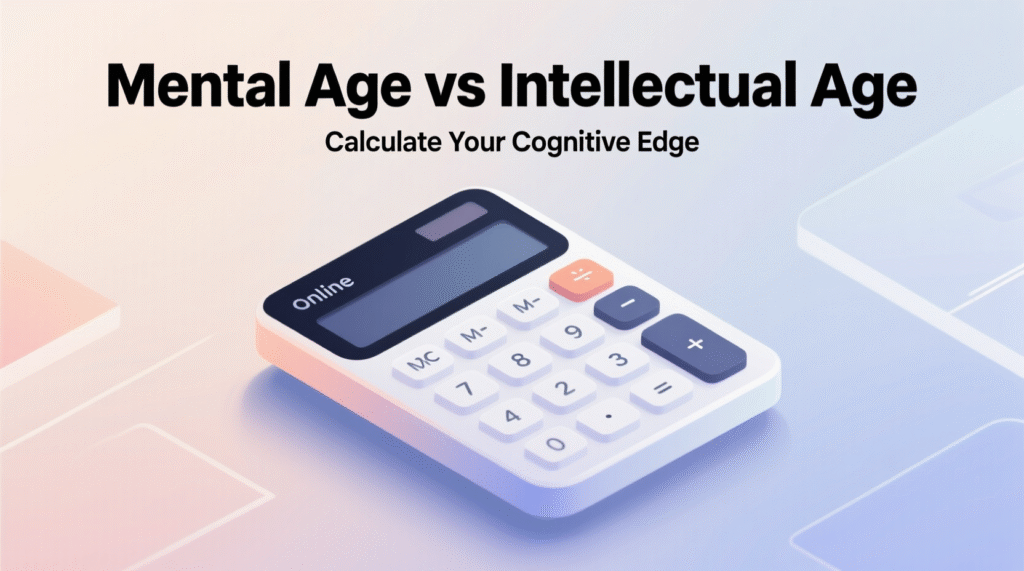
People often confuse mental age with intellectual age, but the two ideas describe very different aspects of how we think and behave. Understanding the difference can help you see why you might feel younger than your real age in some situations, yet show advanced reasoning in others.
What Is Mental Age?
Your mental age reflects how your outlook, behavior, and maturity align with those typically seen in other age groups.
- A 25-year-old who loves playfulness, adventure, and spontaneity may show a mental age closer to 18.
- Another 25-year-old who values careful planning and long-term stability might test closer to 35.
It’s less about intelligence and more about personality, emotional maturity, and mindset.
Take our free mental age test to see how your thinking style compares across different intelligence measures.
What Is Intellectual Age?
Your intellectual age relates to how well you perform in cognitive tasks—things like problem-solving, reasoning, and memory—compared with the average ability of different ages.
- Historically, it came from Alfred Binet’s early IQ tests. If a 10-year-old solved problems at the level of an average 12-year-old, their intellectual age would be 12.
- Today, psychologists use standardized IQ tests and similar tools to measure intellectual ability, not “mental age” as such.
So while mental age is about how you approach life, intellectual age is about how your brain processes information.
Side-by-Side Comparison
| Aspect | Mental Age | Intellectual Age |
|---|---|---|
| Focus | Maturity, behavior, outlook | Reasoning, learning, problem-solving |
| Measurement | Questionnaires, lifestyle reflections | Standardized IQ or cognitive tests |
| Modern Use | Self-awareness, personality insight | Academic and psychological assessment |
| Flexibility | Shifts with mood and life experience | More stable, changes with cognitive growth |
Read is mental age the same as IQ? for a closer look at how IQ relates to mental development.
Why This Distinction Matters
- Self-awareness: Mental age explains why you may relate better to people older or younger than you.
- Learning styles: Intellectual age reflects your strengths in reasoning, memory, and problem-solving.
- Personal growth: Knowing both can help you balance being emotionally adaptable while also sharpening your cognitive skills.
For example, someone might have a youthful mental age—creative, curious, carefree—yet also display a higher intellectual age that makes them strong in analysis and decision-making.
Explore the science behind decision patterns in psychological maturity test.
FAQs
Is mental age the same as IQ?
No. IQ connects more closely to intellectual age, while mental age deals with maturity and mindset.
Can mental and intellectual age differ?
Yes. It’s common to feel younger mentally but show advanced reasoning, or vice versa.
Which is more important?
Both matter. Intellectual age supports learning and problem-solving, while mental age shapes relationships, resilience, and emotional wellbeing.
Do these ages change over time?
Mental age can shift quickly with new experiences, while intellectual age develops more gradually.
Take a deeper look into how intelligence ties in with maturity through mental age vs IQ test.
Final Thoughts
The difference between mental age and intellectual age shows why no single number defines who you are. One reflects how you think emotionally and socially; the other captures your cognitive ability. Together, they paint a fuller picture of your personality and potential.
- A key part of understanding intelligence is seeing how this compares to an IQ test regarding problem-solving skills.
- You can learn how to calculate it scientifically to get the most precise results possible.
- Many professionals suggest taking a psychological maturity test to evaluate your overall mindset.
- It is often helpful to understand how to measure it using standard psychological metrics.
- You should clarify the difference from chronological age to avoid confusing the two concepts.
- Some individuals are surprised to find their mental age is higher than their biological years.
- If you want a quick assessment, you can check it online and get instant feedback.